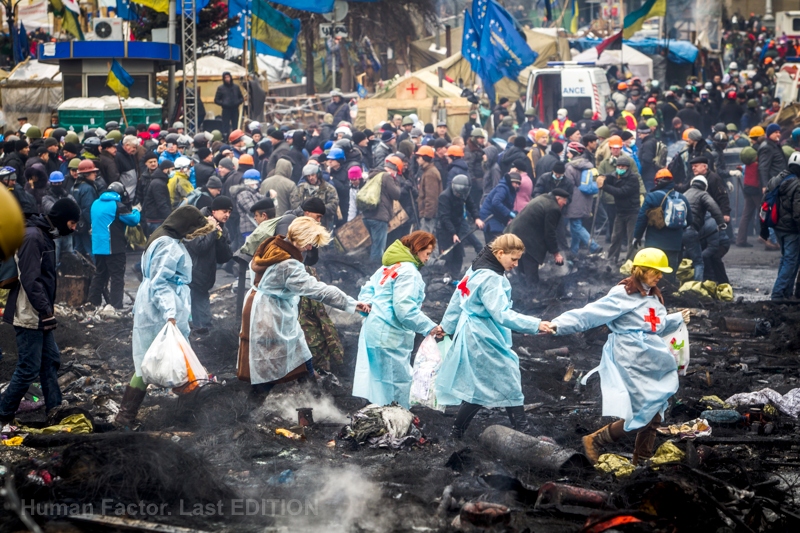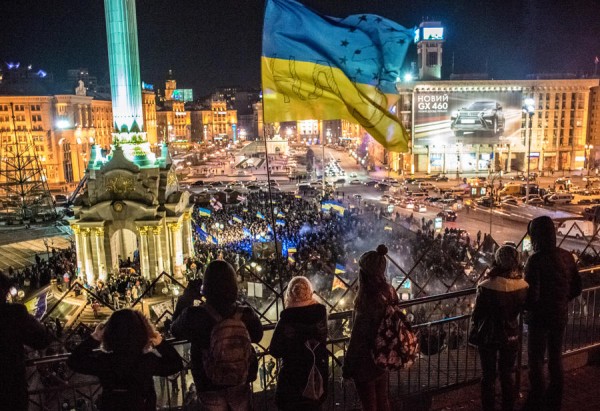Since then, Ukraine has been on a rollercoaster of dreams and crushed hopes. What did Euromaidan achieve? Did it change Ukraine? We asked activists and public intellectuals, and here is what they answered.
What was the place of Euromaidan in Ukrainian history? What has it achieved, and what was not reached?


Nataliya Popovych, Co-founder, Ukraine Crisis Media Center, Founder, One Philosophy
Euromaidan is one of the defining moments in modern Ukrainian history and, in my opinion, it is the most important of the three revolutions that have taken place since 1990. Before Maidan, the outcomes of both, the Granite and the Orange Revolutions.
Triggered by the extreme misinformation and dishonesty of the corrupt Yanukovych government, Euromaidan embodied the fatigue-turned-anger of the Ukrainian people at those who were sworn in to represent them and their interests. It was the ignorance of the people’s will for their country to have closer ties with the European Union, and the inner calling for true freedom of the nation from the chains of its colonial past, that resulted in what was the political equivalent of water breaking a dam.
With much of our history being defined by statelessness and centuries-long struggle for freedom, the martyrship of the Heavenly Hundred served as a tragic reminder to the Ukrainians of the 21st century of what we owe to the previous generations of Ukrainians.
The experience of the Revolution of Dignity amounted to a spiritual reawakening, a macro-renaissance at a national level, as Ukrainians of different backgrounds and histories united to reclaim their democratic rights and dignity back from the Yanukovych regime. Some paid with their time, some with their health, and many with their lives, in their common struggle against an authoritarian state of governance and for the freedom of future generations of Ukrainians to be able to decide the course of their future.The experience of the Revolution of Dignity amounted to a spiritual reawakening, a macro-renaissance at a national level
It brought about the coalition of democratic parties which contributed to the initiating of the process of restructuring the outdated intra-governmental systems that echoed and perpetuated those from the past, notably through efforts of decommunizing the country on social and political levels and countering systemic corruption, while working towards a closer alignment with the EU and NATO and reforming the Armed Forces as needed in our defense in the war against Russia.
Euromaidan sowed the seeds of higher expectations of the citizens towards their state and demonstrated that revolutions in Ukraine have the potential of bringing about positive social change – not only in the shape of the vital reforms, but also in the setup and support of cultural foundations and organizations, such as the Ukrainian Culture Fund, Ukrainian Institute, and others, whose very importance lies in their ability to spearhead the formation of a more resilient nation by way of consolidating the Ukrainian identity in ways that surpass the political.
Unfortunately, the authentic transformation of the elites into a responsible leadership of the country did not take place.
The leading activists of the Euromaidan who went into politics were not able to form a single political force. Some activists joined the government or old-school politicians’ parties contributing to those parties and yesterday’s personalities’ lasting influence, leading to a slower or "modified" reform agenda. Traumas of the Soviet wounds on the society have not healed securely, as shown in the major part of our society still not being immune to populist agendas and willing to delegate their destiny to "higher powers."

Valeriy Pekar, Co-Founder, Civic Platform "The New Country"
Euromaidan is a turning point in the recent history of Ukraine, the beginning of a threefold revolution:
- economic;
- anti-colonial/anti-imperialist,
- and values-based one.
A powerful civil society raised the issue of modernization for the first time in Ukrainian history. For the first time, a final geopolitical choice was made, which was consolidated as a result of Russian aggression.
If we consider Euromaidan not as a revolution, but as a starting point for a long revolutionary-evolutionary process, then it has fully fulfilled its function of launching this process.
Idealistic expectations about rapid profound changes that some had were shattered by the reality of the passive majority of society and the persistence of the oligarchic system. But the process has become irreversible because for the first time the social groups that became its drivers are not ready to give up and return to the previous status quo.

Hanna Hopko, EuroMaidan Civic Sector Activist, Chairman of the Verkhovna Rada Committee on Foreign Affairs 2015-2019; co-founder of the ANTS National Interests Network
Our main task, the importance of which has increased after both the Orange Revolution and the Revolution of Dignity, is to cleanse Ukraine of the influence of Russian agents on governing the country, to make it impossible for Kremlin-affiliated people to come to power, to free the media from the aggressor's narratives and money.
The Revolution of Dignity for those who participated in Euromaidan continues every day:
- in our struggle for the restoration of territorial integrity,
- for the return of Crimea and Donbas,
- for the transformation of governance,
- in defense of Dignity in every act we all do,
- in a rebuttal to the renaissance of the oligarchic clan and the revenge of pro-Russian forces!

Alya Shandra, Euromaidan Press editor
Euromaidan was a turning point on Ukraine’s path to independent statehood and dignified life. It was a reaction to the many ways in which Ukrainians perceived their life as undignified.
It was undignified to live in a police state, where the select few were exempt from the law and the rest could be shot to death in broad daylight; it was undignified to live in lies and permanent corruption embodied by a rotten political system, to be denied a national identity and freedom of national self-determination. Finally, it was undignified to be so poor in a country with such vast resources and potential.
The Revolution of Dignity was a revolt against these indignities, although it started as a geopolitical manifestation. Ironically, Russia’s “punishment” for Euromaidan was decisive in ending Ukraine’s East-West balancing act and the decision of many Ukrainians to put up armed resistance to the Russian world.Russia’s “punishment” for Euromaidan was decisive in ending Ukraine’s East-West balancing act and the decision of many Ukrainians to put up armed resistance to the Russian world.
So, Euromaidan was a watershed moment in Ukraine’s development. Many high expectations that Ukraine will be magically transformed after Euromaidan’s victory did not materialize, leading to disenchantment. But the development of society is an evolutionary, not revolutionary process; it is unreasonable to think Ukraine’s societal system, formed by centuries of repressed national development and 70 years of Communist totalitarian rule, can miraculously change in seven years.
Did Euromaidan change Ukrainian society?

Nataliya Popovych: Euromaidan has triggered the slow but needed reshaping of Ukrainian society. According to a recent World Values Study, trust among Ukrainians has increased from 23 to 30% between 2011 and 2020, demonstrating modest progress while pointing to a nonetheless persisting trend of distrust amongst Ukrainians.People in the heart of Europe sacrificed themselves for the common good so that the rest of the nation could defend its dignity and grow from it - this is unprecedented.
The outcome of the Revolution, however, did set a precedent in that it will forever remain a period of contemporary 21st-century Ukrainian history, where Ukrainians were willing to die - and over a hundred did die - in their struggle of fighting for personal freedom and against dictatorship.
People in the heart of Europe sacrificed themselves for the common good so that the rest of the nation could defend its dignity and grow from it - this is unprecedented.
This sacrifice has inspired a number of people in Ukraine to volunteer, to join the army, to join the ranks of the civil service, to launch and oversee the impressive number of reforms being implemented all at the same time. Euromaidan has contributed to a certain kind of culture of volunteership and civic activism, with NGOs being among the top institutions Ukrainians trust. Ukrainian society is changing. But very slowly - there is still work to be done.
Valeriy Pekar: For the first time, civil society emerged as an independent factor in the political process, going beyond the limited circle of small organizations and beyond the influence of political parties. For many Ukrainian citizens, Euromaidan served as a moment of initiation – when individuals transitioned to a new socio-psychological status of adult responsibility for their country.The active minority of society determines the direction of movement, the passive majority determines the pace - this formula can describe our lives.
Later, this manifested itself in the formation of voluntary and volunteer movements, as well as their mass landings in the parliament and government, as well as in the growth of civic activity on the ground, which enabled the successes of decentralization.
The active minority of society determines the direction of movement, the passive majority determines the pace - this formula can describe our lives.

Hanna Hopko: Euromaidan demonstrated the passionarity of the Ukrainian people and its ability to create a model of society based on Christian values - do not steal, love your neighbor as yourself, do not serve both God and mammon, self-sacrifice as a service to higher ideals! Euromaidan is important in the transformation of civic identity.
Alya Shandra: I think many Euromaidan participants and even observers were fundamentally transformed; the deaths of protesters shot by security forces made it impossible for many to just give up. They keep finding ways to positively change their country. I believe Euromaidan made many Ukrainians take up responsibility for their country. It was also a time of national awakening. But these changes affected a small segment of society.
How would you assess the influence of Euromaidan on processes in other post-Soviet countries? Can we draw parallels with the protests in Belarus?

Nataliya Popovych: I believe that Euromaidan has certainly established itself as an example of challenging the kind of establishment that believes it is invincible. It’s my hope that Belarussians, with their nation being traumatized by the Soviet legacy just as much as ours, continue to fight for their freedom, as well as the freedom of their language and culture after their decades-long subjugation to persecution under the Soviet influence.
Valeriy Pekar: The path of each country is unique and dissimilar to others, so the impact of Euromaidan on the civil society of other post-Soviet republics is very limited. You can't compare Ukraine, Belarus and, say, Armenia or Kyrgyzstan. Changes happened in another direction - in geopolitics. Ukraine's European and Euro-Atlantic turn changed the configuration of forces on the continent, as well as elucidated Russia's strategy of undermining the free world by sowing chaos and enmity.
Hanna Hopko: My dream is to visit Moscow’s Red Square and take part in the unveiling of monuments to the victims of the Stalinist Holodomor and the Putin regime. I believe that Lenin’s monuments will finally be buried and swept away, following the example of the decommunization of Ukraine. The Kyivan Rus must destroy Muscovy as a prison of nations, which was renamed Russia only in 1721. This is Ukraine's mission - to deter the aggressor's invasion of European civilization and democratic values.This is Ukraine's mission - to deter the aggressor's invasion of European civilization and democratic values.
Another sacral example. In 1978, John Paul II, a Pole from Eastern Europe, ascended the papal throne. Soviet dissident Yevhen Sverstyuk told me that then, the dissidents felt that this was the collapse of the Communist system, the end of totalitarianism. When Karol Wojtyla became Pope, Central and Eastern Europe were resurrected. And this was a harbinger of the collapse of the Soviet Union. Obtaining a Tomos on the autocephaly of the Ukrainian Church is a harbinger of the end of the Putin regime.
We must win a historically just victory for Ukraine, fulfill our mission in the 21st century - by protecting the values of the world and promoting transformations in Russia. The battle for Belarus is a geopolitical struggle for the European civilization space and opposition to the "Russian world."
Alya Shandra: Russia’s disinformation campaign was mostly successful in post-Soviet countries, sans a few exceptions: their general population regards the word “Maidan” as a symbol of chaos. Nevertheless, the active minorities in those countries saw that it is possible to rise up against a police state and win. Despite Lukashenka’s regime using Maidan as a bogeyman in Belarus, the core of the protests there is identical to Euromaidan: a revolt against undignified life.
SEE ALSO OUR PAGE DEDICATED TO EUROMAIDAN:
Read also:
- 32 exclusive photos to remember the Euromaidan revolution
- Eleven films about Euromaidan you can watch online
- How it all happened
- Seven years after Euromaidan: how much has Ukraine progressed?

